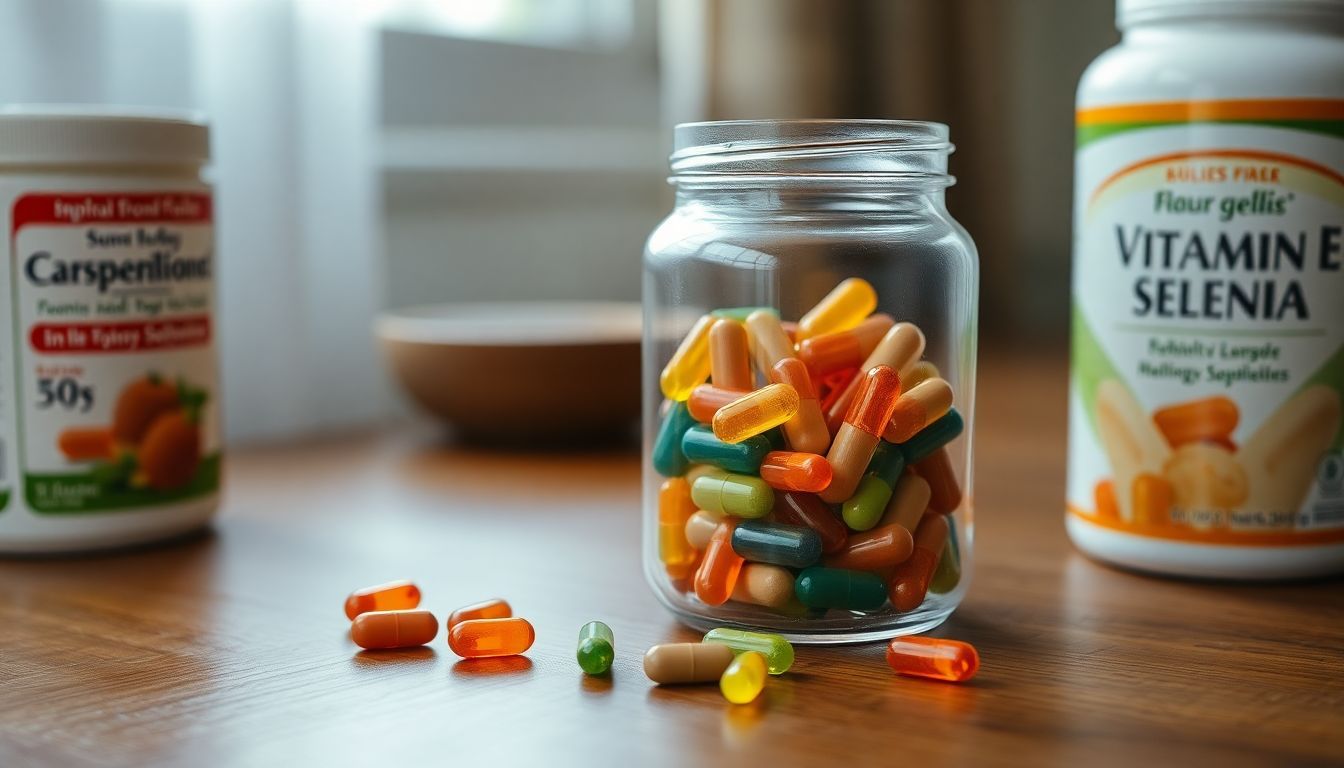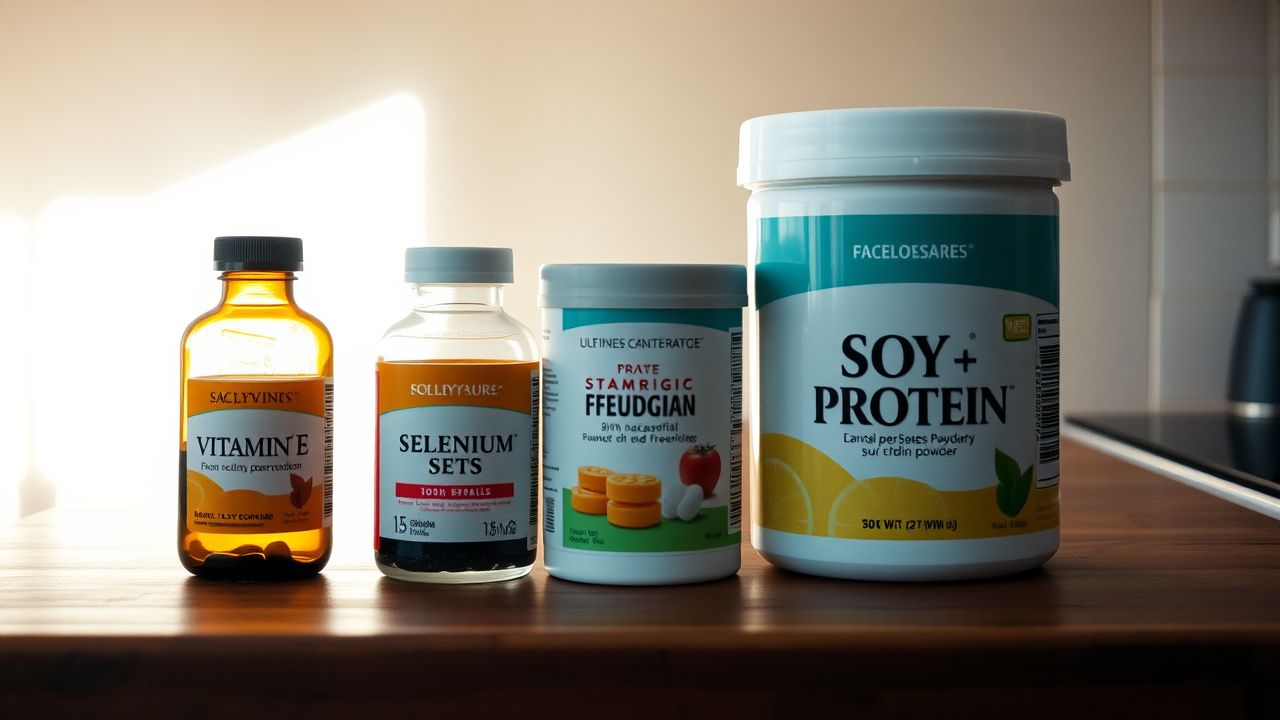Many men worry about preventing prostate cancer. Some turn to supplements like vitamin E, selenium, or soy protein, hoping they help. Studies show this combination doesn’t work and may even cause harm in some cases.
Thank you for reading this post, don't forget to subscribe!This article explains why—and what you can do instead.
Key Takeaways
- The SELECT study found that vitamin E, selenium, and soy fail to prevent prostate cancer. Over 35,000 men were studied with no clear benefits seen.
- Vitamin E alone increased prostate cancer risk by 17% in early findings from 2008. High selenium levels also caused specific risks like high-grade lesions.
- Researchers suspect nutrient interactions and pre-existing selenium levels might explain these results. Most participants already had enough selenium before supplementation.
- Proven prevention steps include a balanced diet, regular check-ups, exercise, and avoiding supplements with unproven claims for cancer prevention.
- Experts advise against high-dose vitamin E or selenium use due to potential harm shown in studies like the SELECT trial.
Overview of the SELECT Study
The SELECT study looked at whether vitamin E and selenium could stop prostate cancer from forming. Researchers studied a large group of men to see the effects over time.
Study design and participant demographics
Over 35,000 men aged 50 and older joined the SELECT trial. African Americans made up 12% of this group because they face higher prostate cancer risks. Participants were split into four categories: selenium with vitamin E, selenium with placebo, vitamin E with placebo, and two placebos.
Another study covered 303 men at 12 Canadian centers. They were randomized into supplement or placebo groups. The supplements included 40 grams of soy protein, 800 IU of vitamin E, and 200 micrograms of selenium daily for three years.
Prostate biopsies occurred every six months to track progress over time.
Key findings and results
The SELECT trial revealed no clear benefit of vitamin E, selenium, or soy in prostate cancer prevention. Among participants, 26.4% developed invasive prostate cancer, showing no difference between groups.
The hazard ratio for prevention was 1.03 (95% Confidence Interval: 0.67 to 1.60; P = .88), proving the supplements ineffective.
Vitamin E caused a 17% rise in prostate cancer cases when taken alone in early results from 2008. By year seven, it significantly increased prostate cancer risk further. High initial selenium levels doubled the chance of high-grade prostatic intraepithelial neoplasia when supplemented too—pointing to new risks instead of protection impacts from these agents’ use against disease progression!
Analyzing the Effectiveness of Vitamin E, Selenium, and Soy
Research shows that vitamin E, selenium, and soy didn’t stop prostate cancer in a key study. Scientists are exploring why this combination fell short of expectations.
Lack of significant results in preventing prostate cancer
The SELECT trial showed no real benefit from vitamin E, selenium, or soy in stopping prostate cancer. Out of 303 men studied across Canadian centers, 26.4% developed invasive prostate cancer.
Both the supplement and placebo groups had similar results, with a hazard ratio of 1.03.
Vitamin E alone raised concern by increasing prostate cancer cases by 17%. This finding led the National Cancer Institute to stop the study in October 2008. Results showed no clear link between these supplements and lower prostate cancer risk.
Possible explanations for the trial outcomes
Vitamin E showed a surprising link to higher prostate cancer risk during the SELECT trial. After two years, researchers observed an increase in cases of prostate cancer among men taking this supplement.
This raised concerns about its safety for prevention strategies. Selenium alone did not cause harm but failed to protect against invasive prostate cancers or reduce overall risks. Both supplements fell short despite earlier hopes and theories.
Differences in nutrient interactions could explain these results. High doses of vitamin E may disrupt body balance, potentially increasing oxidative stress rather than reducing it as intended.
Other studies hinted that selenium might only work for men with low levels initially. Most participants already had adequate selenium levels, possibly limiting any benefit from supplementation.
These findings challenge past beliefs and demand cautious use of such dietary supplements moving forward.

Scientific Understanding of Vitamin E, Selenium, and Soy
Vitamin E, selenium, and soy each play a role in bodily functions. Researchers study how these elements might influence cancer cell growth and other health factors.
Biological roles and potential mechanisms in cancer prevention
Selenium and vitamin E act as antioxidants. These help reduce damage to cells caused by free radicals. Some studies suggested this might lower cancer risk, including prostate cancer.
Antioxidants protect DNA and may slow cancer progression.
Soy contains compounds called isoflavones. These mimic estrogen in the body and might influence hormone levels like testosterone. Balancing these hormones was thought to prevent high-grade prostatic intraepithelial neoplasia (HGPIN), a potential step toward invasive prostate cancer.
Yet, the SELECT trial showed no clear benefit for using selenium or vitamin E supplements against prostate cancer during active surveillance of men’s health outcomes.
Review of previous research and contradictory findings
Earlier studies suggested vitamin E could lower prostate cancer risk. The Alpha-Tocopherol, Beta Carotene study found a potential benefit for men taking vitamin E. This raised hopes that supplements might protect against invasive prostate cancer.
The SELECT trial challenged these findings. Results showed no reduction in prostate cancer risks with either selenium or vitamin E use. In fact, high doses of vitamin E alone seemed to increase risks slightly.
These conflicting results highlighted the need for caution about relying on dietary supplements like Vitamin E and selenium for cancer prevention.
Implications of Research Findings
The study showed this supplement combination did not stop prostate cancer. These results may change advice on using vitamins and minerals for prevention.
Impact on future prostate cancer prevention strategies
Future strategies will likely avoid relying on Vitamin E, selenium, or soy for prostate cancer prevention. Data from the SELECT trial showed Vitamin E might even increase invasive prostate cancer risk after two years.
This finding has raised concerns about using supplements without clear evidence of benefits.
Researchers now aim to study baseline levels of these nutrients in men before supplementation. Understanding how existing plasma levels impact risks could guide more precise recommendations.
Skepticism toward dietary supplement claims is growing—especially regarding high-grade prostatic intraepithelial neoplasia and other early signs of cancer progression.
Recommendations for patients and healthcare providers
Considerations for prostate cancer prevention must focus on proven methods. The SELECT trial showed that vitamin E, selenium, and soy supplements do not prevent prostate cancer.
- Avoid high-dose vitamin E or selenium supplements. Experts highlight their lack of benefits and potential risks, including harm to overall health.
- Focus on a balanced diet with whole foods. Rely on nutrients from fruits, vegetables, nuts, and grains rather than isolated supplements.
- Discuss any supplement use with your doctor. Supplements marketed for cancer prevention often lack evidence and may interact with medications.
- Encourage regular check-ups and screenings like PSA tests. Early detection helps in managing prostate health effectively.
- Maintain a healthy weight through exercise and proper diet. Obesity is linked to many cancers, including invasive prostate cancer.
- Stay informed about new research but remain cautious of unproven claims. Randomized trials are vital for reliable data.
- Healthcare providers should educate patients on the dangers of over-the-counter supplement use for cancer prevention.
- Promote lifestyle changes like quitting smoking and reducing alcohol intake as safer approaches to lowering overall cancer risk.
- Raise awareness about HGPIN progression risks but avoid recommending untested combination therapies like selenium, soy protein, or vitamin E.
- Always rely on evidence-based guidelines from trusted sources like the National Cancer Institute or American Urological Association for patient care decisions.
Alternative Approaches to Prostate Cancer Prevention
Regular exercise and a balanced diet can help support prostate health. Exploring other supplements or nutrients may also offer new possibilities for prevention.
Lifestyle modifications and dietary recommendations
Small changes in lifestyle and diet can help with overall health. Though this combination of vitamin E, selenium, and soy did not prevent prostate cancer, healthier habits may still benefit men’s health.
- Eat more fruits and vegetables daily. These foods contain vitamins and antioxidants that can support the body’s defenses.
- Reduce red meat and processed meat intake. Studies link high consumption of these meats to a higher risk of invasive cancers, including prostate cancer progression.
- Choose whole grains over refined grains. Whole grains provide fiber, which aids digestion and may reduce disease risks like type 2 diabetes mellitus.
- Maintain a healthy weight through balanced meals and exercise routines. Excess weight is linked to inflammation and hormonal imbalances that could affect prostate-specific antigen levels.
- Limit alcohol consumption to moderate levels or avoid it completely if possible for better long-term health outcomes.
- Avoid smoking as it increases many cancer risks, including age-related diseases such as macular degeneration or even cardiovascular events later in life.
- Stay active with at least 30 minutes of fitness activities most days of the week. Physical activity improves testosterone levels naturally while reducing stress hormones.
- Include sources of omega-3 fatty acids like fish or walnuts in your meals for their anti-inflammatory properties beneficial to men’s health research studies.
- Consult healthcare providers regarding personalized advice on other safe dietary supplements beyond folic acid or soy protein alternatives already studied in randomized trials like SELECT.
Adopting these measures consistently might impact prostate cancer prevention strategies positively… now let’s explore emerging research on other nutritional supplements!
Emerging research on other nutritional supplements
Recent studies explore how other supplements may impact prostate cancer prevention. For example, folate—a B vitamin—has gained attention. Some findings show links between high doses of folic acid and increased cancer risks, but natural dietary folate may have protective effects.
This highlights the importance of nutrient sources.
Canadian researchers are also investigating compounds like lycopene from tomatoes or green tea extracts. Both are packed with antioxidants that might target cancer cells. While promising, these approaches lack conclusive evidence in clinical trials.
Lifestyle modifications remain crucial for men’s health alongside ongoing research into new solutions… leading to alternative strategies for prevention methods.
Conclusion
The combination of vitamin E, selenium, and soy doesn’t stop prostate cancer. Studies show no real difference between those taking supplements and those on a placebo. This highlights the need for more precise research in cancer prevention.
Instead of relying on supplements, focus on proven steps like healthy eating and regular check-ups. Prostate health deserves attention grounded in science, not assumptions.
For more insights on how certain supplements may impact your health, read our article on “how melatonin can help solve your sleep problems.”
References
- https://www.cancer.gov/types/prostate/research/select-trial-results-qa
- https://pubmed.ncbi.nlm.nih.gov/19066370/
- https://pmc.ncbi.nlm.nih.gov/articles/PMC4169010/
- https://www.health.harvard.edu/blog/vitamin-e-selenium-soy-combo-doesnt-prevent-prostate-cancer-2009092914713 (2009-09-29)
- https://pubmed.ncbi.nlm.nih.gov/21537051/
- https://www.nih.gov/news-events/nih-research-matters/dietary-supplements-fail-prevent-prostate-cancer
